
I’m thinking of an alternative inscription for my eighth-grade yearbook, something that, amidst all the glowy predictions of the great things to come from me, would have been truly prophetic. I place it on the page where I am pictured with Matthew Curley as the girl and boy voted most likely to succeed. In an unknown hand it reads, “You look promising now, but don’t be fooled. By the time you are thirty you will be confined to two rooms of your house, barely able shuffle from the bed to the toilet, to dress, bathe, and brush your teeth. You will have no profession, earn no money. All day, every day, you will have to do the hardest thing for you—nothing.”
Besides the standard praise of my niceness and cuteness, many of the actual inscriptions envisioned the future me as what my friend Kathryn calls Our Lady of Perpetual Success. One doozy reads, “I know you will succeed! When you’re rich and famous and on the cover of People remember me!”—written by Donna Davidson, whose photo triggers a faint recollection. Reading the inscriptions now confirms the sense of betrayal I have long felt—like, what a set-up. I don’t know what has become of Matthew Curley, but on the next page I’m pictured again, this time with Yann Christensen, as most studious. I believe he works for Microsoft and must by now have many pretty pennies in his big bank account. He probably also competes in triathlons.
A few years ago my mom cleaned out her attic and sent me, in addition to my old yearbooks and a bunch of junk I once treasured, a pile of children’s books. I Can Be Anything You Can Be! (1973), written by Joel Rothman and illustrated by Susan Perl, was one of the few worth keeping. As much as I love the book, with its frumpy-baroque illustrations and seventies feminist agenda, I’m not sure I’d read it to my daughter, if I were lucky enough to have one, and I certainly wouldn’t read it to my boy. Like the yearbook, it gives material evidence of those otherwise ephemeral and intangible forces—the expectations and values of those who nurture and surround you—that shape a kid’s mind and launch her into the world.
The first spread of I Can Be Anything You Can Be! shows a boy on the left-hand page sitting in the grass and looking thoughtfully, and a little fretfully, at a girl on the right-hand page. The text by his head reads, “When I grow up, I can be anything I want.” The boy has no props or special attire, but the little girl wears a pilot’s cap and holds a wrench in her hand. A stethoscope hangs from her ears and other tools strain her lab coat pocket. She sits in the grass too, and a wide-eyed lady bug and caterpillar back up her self-assured answer to the boy: “When I grow up, I can be anything you can be.”

The rest of the book shows a different boy on each left-hand page, engaged in a profession and usually making a claim of female exclusion. The right-hand pages show girls of various ethnicities boastfully carrying on those very professions with ease. He says, “I’ve never seen a girl play a trombone.” She says, “Just watch me. I can play that horn—probably better than you!” He glumly listens to a cat’s heart while many bandaged and sickly creatures await their turn for treatment. “You can’t be an animal doctor,” he says. “Sure I can be a veterinarian,” she retorts, using the professional term to outdo him. Her animal patients—a fish with crutch, a caterpillar, frog, and ant sharing a hospital bed, a dog having a hind leg bandaged, and a small crowd of others waiting—all look pleased with and confident in the care they are receiving, a telling contrast to their worried counterparts on the other page. Girls can do it; and girls will do it better.
He may “study chemistry and become a scientist,” but she will “probably make an important discovery way before” him. Sure he can be a jockey, but she’ll win every race. Brave enough to tame a lion? She’s “not afraid of lions at all.” And, depending on her desire of course, she could also conduct an orchestra, call the outs at baseball, pull teeth, fly a plane, be the first female in space (with flowers perched atop her helmet and a cute miniskirt-fringed spacesuit), and keep order in court.
Finally, a little bald black boy wearing a red-and-white-striped jacket and a stars-and-stripes top hat goes for the big one: “Well, I can be President. That’s one thing you could never be.” Of course, a little black girl clutching a grandma pocketbook smiles knowingly from the right-hand page. “That’s what you think—I can be president, too.” On the next spread a white, red-freckled boy points at a red-haired girl. The look of horror on his face is the climax of the book. “You can’t be President. There’s no such thing as a lady President.” The girl stares him down, mean, determined, and tongue out: “I’ll show you—I can be anything I want to be—anything at all.” On the final page a little boy shrugs, “Hmmm—maybe she can?”
There are so many things to say about this book and its messages or, dare I say it, lies. It defines girls’ desires and possibilities in terms of historical male occupations, personalizes the limits placed on girls’ ambitions as if little boys wielded power, disappears the social/political reality of race behind a rainbows-are-beautiful representation of human physical diversity, and implicitly denigrates the many varieties of human labor which do not involve high romance, power, or a crisp white collar and a big paycheck. We may be getting close to the day when a black man could be elected president of this country—if he has very, very light skin and nothing-special politics—but what a cruel joke in 1973 to put black boys on the page of privilege as if they were holding little girls of all colors back from their dreams. There are a number of black women I would like to win presidential power, but they aren’t fool enough to think a black woman’s desire is the only force shaping her destiny, or that a black woman in a high place is anything very fine if she serves the masters, not the people.
Of all the lies in this good book, the one which persistently toys with my own mental health and which also pervades American culture, largely unquestioned, is what I call the Want and Will Philosophy of Life. In practice, it oppresses men as much as women. You can be anything you want. Your desires and will to achieve are the only things shaping your life. If your work is exciting, important, and glamorous then you are exciting, important, and glamorous. Know what you want, work hard, go for it—and the world will be yours.
Everyone can cite the supercrips and wonderpeople to prove there are no exceptions. Like the armless boy I read about as I flipped through an old Life magazine, who grew up to be a wealthy private eye, a sort of real life James Bond. Or, more recently, Laura Hillenbrand, who despite the leaden weight of chronic fatigue syndrome wrote the best-selling Sea Biscuit, later made into a blockbuster movie. Then there’s popular science superstar Stephen Hawking, never balking at taking on Time and the Universe. And I can’t leave out the ever-useful Lance Armstrong, who got very lucky indeed, but gets all the credit for it.
The good cripples work hard and never give up, and so they march or roll or scoot two by two—a couple of quadriplegics, a pair with cerebral palsy, a blind woman and man—into the great ark of success. Success. Success is their salvation. How many times in your life have you seen a representation of Noah’s Ark crammed with animals saved from the Flood? But what of all the people and creatures that were not on the Ark? Oh, they drowned. Why? Well, God drowned them all because some of them were bad. Not such a nice picture for the nursery. The ubiquitous happy-cute use of the Ark story is emblematic of a widespread failure of imagination. We take exceptions and hold them up as standards for all. Sure, blind individuals have excelled in many professions. But the vast majority of the blind are poor and unemployed or underemployed. Telling and retelling the stories of the high-achieving few conveniently frees us to ignore the many and the sociopolitical aspects of their situations.
It’s in this context of naive narrative and big expectations that an individual has to grapple with the real limits of her life. If what I do is who I am, then if I can’t do anything I must not be anybody. If my life is mine to shape without limits, then I must have really fucked up. No, I must be inherently doomed; it must be my very personality that’s causing all this trouble. Tell a girl it is her place in the world to do what she wants, then, when she has grown to a woman, take away her ability to do anything. What happens to her mind?
In case you’re wondering, I’m a little better now, at thirty-five. I can walk from the bed to the toilet without difficulty, and really walk almost as much as I want on the first floor of our house, though I haven’t seen the second floor in over five years. Brushing my teeth is almost never hard. I can even floss, if I do it in the morning. I still have to go down stairs sideways and, until very recently, up with a rest at each step, though lately I’ve been climbing up to three steps leg over leg. Only rarely will I climb a full flight. When I do, at least my husband doesn’t have to set up a folding chair on the landing for me to rest on halfway up, and when I get to the top I don’t feel like I’ve used most of my energy for the day. My once-a-week “long” walk is up to five minutes. I can type a little and use a mouse if I tap it with the side of my fist instead of pressing with my fingers. Hell, four years ago just the sound of a computer was more than I could handle, never mind using one. I’ve come a long way, baby.
Facing a radically restricted physical life and the eventually inescapable admission that my strong will and stronger desire had no magical power to bring my body back to functionality, I had to find some understanding, besides the vision of accomplishment I was reared on, of what makes a life well-lived. Of course, lips wag all over the place about what’s really important—love and all that. But serious protracted illness would prove to many Americans that their hearts serve other gods. I do therefore I am. I look good therefore I am. I wear great clothes therefore I am. I have a great house therefore I am. I make money therefore I am. I am so wonderfully creative and great to be with therefore I am. Etc., etc.
One of our most cherished narratives about the disabled or sick is the enlightenment story. You know, a terrible accident paralyzes Johnny Middle America and destroys his once bright future as a hockey star. He struggles mightily with recovery and in the process discovers life is beautiful after all, especially because that gorgeous girl who helped train him on assistive devices has fallen for him. She gives him the tough love he needs, and together they forget entirely his paralysis and remember always the real meaning of life.
Don’t count on rapid sainthood to save you from despair. Being sick for a long time can force you to see just how very unenlightened you are; at least, it did for me.
But remember paralyzed Christopher Reeve? He announced to the world that Nothing Is Impossible and then walked . . . oops, I mean died. A lot of things are impossible, including that everybody can get or be everything and anything they want. Al Gore—white man—wanted to be president of the USA, but five people on the Supreme Court did not want him to be president and so on January 20, 2001 the other fool got what he wanted.
I read Reeve’s book, and he had better things to say than his title indicates. One of them was that people with spinal cord injuries could have much more physical function if they had access to proper long-term therapy. But mostly they don’t. And that is my point. We have choice within context; we do not have control. I don’t begrudge Laura Hillenbrand, Stephen Hawking, Lance Armstrong, and Christopher Reeve their successes. I do resent a culture which uses the stories of the stars to evade the real and ordinary struggles of everybody else, few of which yield such profit.
Last spring, Elizabeth Edwards, wife of John Edwards, candidate for the Democratic nomination for president, was diagnosed with a recurrence of breast cancer. John announced that he and Elizabeth had no intention of “cowering in a corner,” and he would continue his campaign. Maybe he will be the next president, and maybe he won’t. But Elizabeth is going to die. Limits are real. For everybody. The rightness of their decision can’t be judged from the outside. But I wonder, will he look back and be glad he chose the campaign trail for her last healthy years? More importantly, is “cowering in a corner” really an apt characterization of the alternatives?
Some afternoons I still stare into the abyss. I lament silently, mope, and curse my useless life. Finally my husband Larry finishes his work and descends the stairs from his office for the last time that day. I hear him in the kitchen—chopping onions, putting water on to boil, or emptying the dishwasher—as I climb the three steps from my room and round the refrigerator. Then I see him there doing what needs to be done and realize one more time what an idiot I am. I’ve made myself unhappy all afternoon coveting my neighbor’s life. If I lost Larry I would wish that I could give up something, even the hope of ever being well again, just to have another chance to round that corner and see him cooking dinner. For me, the antidote to the misery of the Want and Will Philosophy of Life has been turning my attention from getting what I want to receiving what is given.
Oh, and just for the record, since presidential campaigns are ramping up and a certain female is the Democratic front-runner, I’d rather vote for a peace-loving weightlifter with two penises than a woman for war.





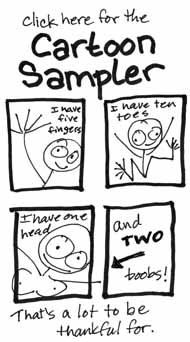

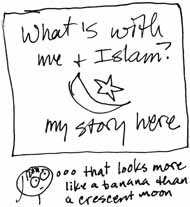
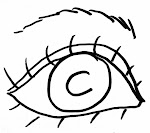


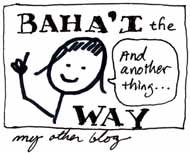
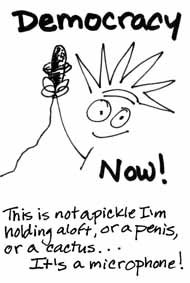




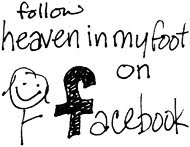



Priscilla,
ReplyDeleteThis is really good. I mean really good. Have you ever thought of trying to get it published? You've found an angle, or rather several of them, which contribute to make this a very compelling piece of writing.
First, there's issue of people with disabilities, all the public examples of triumph over adversity vs. the reality of accepting very real limits. Next there's the whole 70's feminism, 'girls can do anything' idea: what a simple way to view the world that was! And then, finally, there's the whole bogus 'American dream' myth that determination to 'succeed' is your only limit. You touch on all of these big themes, and I wouldn't be surprised to read this on Salon.com or in Harper's.
But on a more personal, more human level, I also want to say that I'm moved by your story. To some extent, every life is a disappointment, but you've obviously had to deal with more of it than most of us. From the high hopes of your school years to realizing that there were real limits you couldn't overcome, there must have been an incredible adjustment. The gap between dream and reality, part of every life, must have seemed especially broad in yours.
Brendan
priscilla,
ReplyDeletei visited your bahai site some time ago, and come to this blog independently from annalog. you're all over the web :)
this is an excellent piece, and touches a point i have thought about for some time. my only push-back would be that talking about exceptions is another way of talking about heroes. hero-talk is in my view necessary to maintain and inculcate ideals. where we go wrong is when we collapse the distinction between ideals and everyday reality. i should always have ideals to look toward and heroes to look up to, but i would be lying if i said everybody is a winner and everybody is a hero. that's what happens with "i can be anything you can be".
as for your personal reflections on physical limitations, milton offers a much more sublime (and, ironically, useful) view than our children's books today:
ON HIS BLINDNESS
John Milton
When I consider how my light is spent
Ere half my days in this dark world and wide,
And that one talent which is death to hide
Lodg'd with me useless, though my soul more bent
To serve therewith my Maker, and present
My true account, lest he returning chide,
"Doth God exact day-labour, light denied?"
I fondly ask. But Patience, to prevent
That murmur, soon replies: "God doth not need
Either man's work or his own gifts: who best
Bear his mild yoke, they serve him best. His state
Is kingly; thousands at his bidding speed
And post o'er land and ocean without rest:
They also serve who only stand and wait."
excellent. I repeat: excellent. I agree with every word.
ReplyDelete(I came here by following the link from mole; will definitely come again.)
Your writing is beautiful and poignant. I work as a chaplain in a children's hospital, and I appreciate the glimpse into many of their home lives and futures. I pray it will make me a more empathetic pastoral presence to them.
ReplyDeleteI am with you on the doubly endowed, body-building pacifist. And I resent having my feminist credentials questioned for it.
I started this essay after looking at old yearbooks for the first time in a long time. In some ways the people in those yearbooks are more real to me than anybody, as so many of them were part of my world for a long time in a kind of elemental way, like wind or sunlight. In other ways it seems they must have existed only in my imagination, like all those memories were put there artificially to give me the feeling that I lived a past. But now comes Facebook and the odd experience of cyber-reunion. Amazingly, most of those people still exist. And there they are, with faces I can usually recognize and lives I know nothing about. And I’m surprised by how clear people are to me, and how memories that seemed at first not to be there at all surface and are as vivid as the ones I never misplaced. So when I first saw Donna Davison’s name in my yearbook (I’m going to have to be more careful about using real names), I wasn’t sure I knew who she was. And now I can hear her voice in my head, quite distinctly; although, I still don’t know what has become of her.
ReplyDeleteI've only just read this piece - where have I been all your life? - and I wanted to add my little bit of praise and thanks for your essay. It is, as others have said, really good, really thought-provoking, honest. I'm so glad you've taken a poke at the horrendous uber-feminism of the children's book and at the kinds of narratives that deny the value of so many lives and render so many people invisible.
ReplyDeleteThank you.
Thank you very much, Barney. I'm pleased to see this piece is still getting an occasional reader because it is one of my favorites.
ReplyDeletebest,
Priscilla
Priscilla, Outstanding post. I really enjoyed reading it and I found the subject compelling particularly from your vantage point.
ReplyDeleteThe line that resonated most with me (aside from the black kids in that book, which you couldn't be more right about), was the part about changing your mindset from 'getting what you want to receiving what is given.' That was a process I went through as well. I also had to take it a small step further(or backward maybe) by also being happy about what is received. Not satisfied or complacent about it, but to receive what is given for what it's truly worth on an emotional level.
I'm succeeding and failing so much everyday that I no longer keep track, but I can say that I'm generally happy on a day to day basis. In my world, that's success. Geez, I'm babbling.
Thanks for a wonderful, insightful post Priscilla. You rock. :)
"Don’t count on rapid sainthood to save you from despair."
ReplyDeleteI'm coming late to this, but thanks for the post, and thanks especially for that line.
I'm not sick. I needed to hear that anyway. I suspect a lot of people do.
You offer quite the honest, enlivening suite of ideas. Thank you for feeling.
ReplyDeleteP.S. ~ We share an erstwhile angel by the name of Alan, so I feel in your secondhand company often.
ReplyDeletePriscilla,
ReplyDeleteI am becoming one of those bitter disabled people who is sometimes envious of the healthy, the talented, of those who are still brave(?) enough to follow their dreams, and of those whose meds/lifestyle has not made them fat and hideous.
BUT I thank you for a needed smack of perspective because most days, I CAN get out of bed and use the stairs.
Looking forward to more words and drawings when you return from your sabbatical,
Debi
A wonderful essay...shared sentiments...but also important to me...are your drawings - as well as your writing and razor sharp wit. I am now an official FAN (which i can prove as I've linked your works to my FB page...bragging about your talent!) I "found" you and your coterie of stick-folk by way of my friend jerry...a perfect fit. I used to be an artist when i was alive (cartoons were my first love)...and reading/viewing yours afforded me the first good belly laughs I've had in a long while! I laughed out loud. OUT LOUD!...when i first saw them...then when I glanced down to the bottom of the page i was reading...and was greeted by MORE (your clever joke about fainting) - i laughed out loud again (and so did my husband!...who, unlike me, is HARD to please). do you realise what that means to those of us living in solitude? (even those of us surrounded by husbands...and Pomeranians etc) The importance of what you're doing?(I often feel like i've been condemned to solitary confinement...for a crime i didnt commit!) I now look forward to you...as i do to my one tiny cup of java in the morning...so keep it coming (for my sake)
ReplyDeleteTo say i (and my "career") have been sidelined by severe ME/cfs is an understatement (good days=housebound/bad ones=bed)....but i must give you credit for inspiring me to attempt to draw again! something clicked in my poor addled brain when i started to read your funnies...and i allowed myself to confront the deep sorrow i experience daily, for the loss of all things artistic. so...next step will be a digital drawing pad (one i can use while propped up in my bed, i hope)...and one thats compatible with interference by assorted Pomeranians, pill keepers, fuzzy blankets, wooley socks, water bottles...oh, i could go on and on...but you get the drift. so a big thank you for the inspiration to try again.
btw...i also have the toes/feet/legs/hands pain you talk about (i call mine "the meat-grinder" - an exquisite pain...a devilish sort of unrelenting, unremitting pain...that at times defies description!)...i have small fiber neuropathy (SFN)..damage caused by the chronic viruses of ME/cfs.
regards....jackie
ME/cfs since birth (59 yrs), long term, high dose antivirals...soon: ARV's.
DOC: Dr.John Chia
Dear Anonymous,
ReplyDelete"....but i must give you credit for inspiring me to attempt to draw again!"
Hooray! Have you read my post on starting cartooning? If not, it may give an additional boost:
http://www.heaveninmyfoot.com/2010/05/start-cartooning.html
my very best to you,
hope to hear from you more,
Priscilla
Priscilla-
ReplyDeleteWhat a wonderful piece! You are so articulate.
I've been sick with CFS 33 years. I've spent many of them confined to bed and too weak to brush my teeth or bathe or even lie propped up. I am currently bedridden.
My highschool class is planning their 40th reunion now via Facebook. Even if I were well enough to go, what would I say to all these people who lived out their lives, if not their dreams? "While you were worried about your jobs and careers; your families; your cars, houses, clothes, looks, I was worried about whether or not someone would bring me my next meal in bed, brush my teeth for me or get my mail from my mailbox? I was worried about whether or not I would have the strength to walk the 15 feet to the toilet and make it back to bed?
Your reference to Laura Hillebrand really hit a nerve with me because my own mother reprimanded me by holding her up as an example! If Laura could do it, then why couldn't I?
By the way, I recently tested positive for XMRV.
Priscilla, you write with such great insight. May we all have greater freedom from "the Want and Will Philosophy of Life" and receive what is given with grace and hope (and a few grumpy days thrown in for good measure). Peace to you...
ReplyDelete